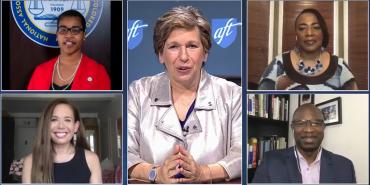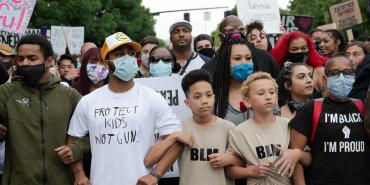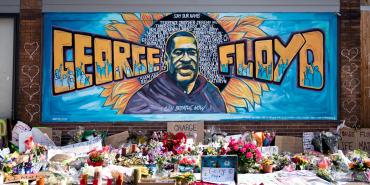Conversations about the three crises facing the country—the public health crisis, the economic crisis and the crisis of systemic racism—are embedded in this year’s AFT convention. A July 29 panel discussion focused on racism in America and the Black Lives Matter movement. The panel included the Rev. Dr. Bernice King, CEO of the Martin Luther King, Jr. Center for Nonviolent Social Change; New York Democratic congressional nominee Jamaal Bowman; Leslie Redmond, president of the Minneapolis NAACP; and Sari Beth Rosenberg, a history teacher in New York City. AFT President Randi Weingarten led the conversation.
Weingarten began by noting that, “As a white person, I have privileges that people of color do not. … As white people, we have to understand our responsibility in acknowledging white privilege.” Calling on all of us to work together to end long-standing, systemic racism, she said: “Slavery is not only one of America’s original sins, but frankly the Civil War did not end the deprivation and the discrimination for Black people. Rev. Barber, Rev. King and others have talked about this for decades. Lynching, Jim Crow, mass incarceration—these are all the remnants of slavery. That’s why white silence must stop. This should not just be a fight that our Black brothers and sisters have to do themselves. It’s a fight that all of us need to do. And, indeed, white silence has been complicit in discrimination,” said Weingarten. “It’s time to own our responsibility to push for an anti-racist America.”
Before the discussion began, the panel took a moment to remember Rep. John Lewis, viewing a video tribute highlighting his accomplishments as a civil rights leader. Weingarten then turned the conversation to her panelists, starting with the Rev. Dr. Bernice King, the daughter of Martin Luther King Jr. and Coretta Scott King. She continues to advance her parents’ legacy through her work at the King Center in Atlanta.
When asked about her vision and next steps that the AFT family should take to actualize her father’s dreams, King said, “One of the things I think is very important … is we’ve got to find a way to create new curriculum … to introduce into our school systems. Part of the problem is that we have left out some critical parts of who … we are as Blacks in America in terms of our contributions to this nation, things we have built, things we have invented. … All of that is missing from our history. If we can raise up new generations of people who understand and value the contributions of all citizens of America, I think it’s one of the ways that we can begin to do away with systemic racism.”
Jamaal Bowman, an educator and advocate for public schools for nearly two decades who is likely to become a representative in the U.S. House of Representatives in November, agreed that new school curriculum is essential. He said, “Anti-racist, anti-hate curriculum has to be implemented in every school in this country. As a Black man in America, I did not learn about my history in public schools. I had to go outside of public schools to learn about my history, to learn about my culture. … One of the enduring or continuing legacies of racism is the idea that to be white makes you superior and to be Black makes you inferior. But when you learn about your history and your culture, you realize that is not the case and you begin to live on an equal playing field with those who are white or those who represent other cultures.”
Bowman wants to use federal policies to incentivize states and school districts to implement multicultural curriculums that include Black, Latinx and Indigenous people. By implementing such curriculum at the K-12 level, we can see transformational change for generations to come, said Bowman.
As Bowman prepares to go to work in Congress, he is looking at structural racism and institutional racism wherever it exists in our country, including in policing, mass incarceration, education, and wealth and economic inequality. “I want to be a part of a Congress that creates a post-racial, anti-hate society. The time is urgent now to get it done, and the country is demanding it. COVID has revealed what we already knew about the inequalities. I’m fortunate to be a part of the conversation at this moment.”
‘Education is the most valuable tool to dismantle racism’
“Education, hands down, is the most valuable tool to dismantle racism,” said Rosenberg, a veteran teacher with 18 years of experience teaching history in the classroom. During her remote instruction near the end of the school year, Rosenberg changed her lesson plans to incorporate more about the civil rights movement and Black Lives Matter in response to the George Floyd protests.
When it comes to what the AFT can do, Rosenberg said that educators should start by understanding the importance of learning about their students’ backgrounds. Her mantra before designing her curriculum is: “If you can’t see it, you can’t dream it,” because, as she puts it, if her students only see themselves as victims or enslaved people in the American story, “then how do they find their path to greatness, which I think they all deserve?”
Leslie Redmond, civil rights advocate and president of the Minneapolis NAACP, shared a personal and systemic concern. “Too often we talk about education as being the great equalizer, but if that’s true it has also been the great divider,” said Redmond. “Long before young people engage with police officers we are engaging with teachers, and I can say from being in the inner city and public schools, teachers have either been my greatest asset or the greatest liability to my future,” said Redmond.
She urged teachers and people who can affect policy to listen to Black people. “Too often, we think that we know what’s best for the Black community, versus allowing the Black community to show you that we’ve experienced racism and white supremacy for over 400 years and we know exactly what it looks like and exactly how to deal with it,” she said. “That’s what we are seeing in Minneapolis,” she added. “If given the opportunity, we can rise to the occasion.” Redmond also pointed to her “Don’t Complain, Activate” campaign, which encourages community members to get active through communication, collaboration and compassion.
Weingarten asked Rosenberg how she will take the lessons from the panel to her white colleagues. “First we must remind them of their privilege,” said Rosenberg, and tell white teachers that they need to have more brave and honest conversations so they can go into their classrooms with authenticity. “Be ready for pushback, but have faith that you are doing this for the greater good, and it will click,” said Rosenberg.
King agreed, saying, “If we are going to make progress on the racial front, it will take the white community to step up to the plate, because for decades, Black people have been fighting this fight and doing it alone.”
King said the work will be tough and uncomfortable for the white community, because the move toward equity will require sacrifice. “But it is necessary, if we are not going to revisit over and over again the terrible things that we keep witnessing and those of us in the Black community continue to experience.”
King has hope; she has faith in the generation of young voices who have not let us go back to business as usual with their insistence that Black lives matter and their willingness to do what’s necessary to eradicate racism.
[Adrienne Coles]




